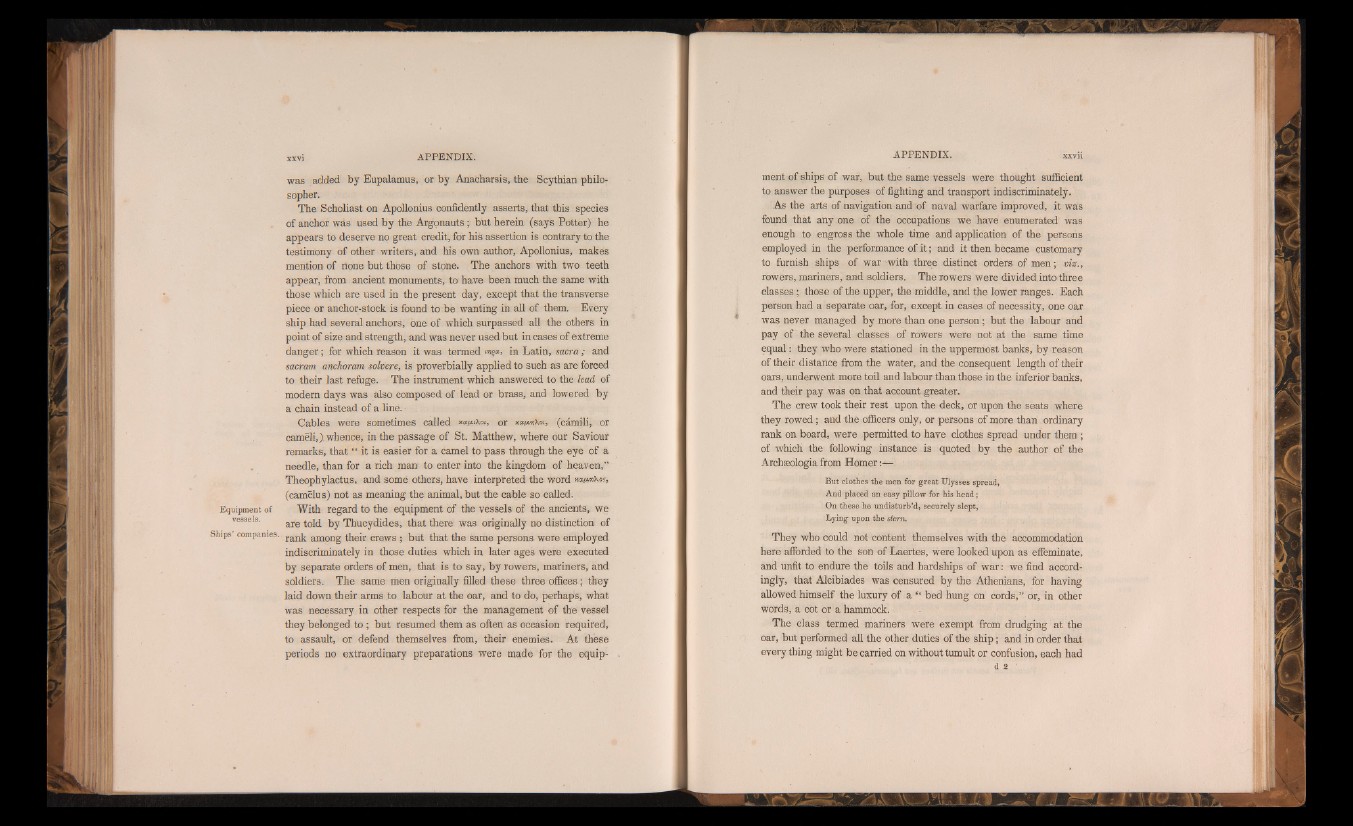
was added by Eupalamus, or b y Anacharsis, the Scythian philosopher.
T h e Scholiast on Apollonius confidently asserts, that this species
of anchor was used b y the Argpnauts ; b u t herein (says Potter) he
appears to deserve no great credit, for his assertion is contrary to the
testimony of other writers, and liis own author, Apollonius, makes
mention o f none but those o f stone. T h e anchors with two teeth
appear, from ancient monuments, to have been much the same with
those which are used in the present day, except th a t the transverse
piece or anchor-stock is found to b e wanting in all of them. Every
ship had several anchors, one of which surpassed all the others in
point of size and strength, and was never used but in cases o f extreme
d a n g e r ; for which reason it was termed me*, in Latin, sacra ; and
sacram amhoram solvere, is proverbially applied to such as are forced
to their last refuge. The instrument which answered to the lead, of
modem days was also composed of lead or brass, and lowered by
a chain instead of a line. -
Cables were sometimes called **/*Aoi, or »«inta, (camili, or
cameli,). whence, in the passage o f St. Matthew, where our Saviour
remarks, that “ it is easier for a camel to pa ss through the eye of a
needle, than for a rich man to enter into the kingdom of heaven,”
Theophylactus, and some others, have interpreted the word
(camelus) not as meaning the animal, but the cable so called.
With regard to the equipment of the vessels of the ancients, we
are told by Thucydides, th a t there was originally no distinction of
rank among their crews ; b u t th a t the same persons were employed
indiscriminately in those duties which in la te r ages were executed
by separate orders of men, th a t is to say, b y rowers, mariners, and
soldiers. T h e same men originally filled the se three offices; they
laid down th e ir arms to labour a t the oar, and to do, perhaps, what
was necessary in other respects for the management of the vessel
they belonged t o ; b u t resumed them as often as occasion required,
to assault, or defend themselves from, their enemies. At these
periods no extraordinary preparations were made for the equipment
o f ships of war, b u t the same vessels were thought sufficient
to answer the purposes of fighting and transport indiscriminately.
As the arts of navigation and of naval warfare improved, it was
found that any one of the occupations we have enumerated was
enough to engross the whole time and application of the persons
employed in the performance of i t ; and it then became customary
to furnish ships of war -with three distinct orders of men ; viz.,
rowers, mariners, and soldiers. The rowers were divided into three
classes ; those of the upper, the middle, and the lower ranges. Each
person had a separate oar, for, except in cases of necessity, one oar
was never managed b y more than one p e rso n ; b u t the labour and
pay of the several classes o f rowers were not at the same time
e q u a l: they who were stationed in the uppermost banks, by reason
of their distance from the water, and the consequent length of their
oars, underwent more toil and labour than those in the inferior banks,
and their pay was on that account, greater.
The crew took their re s t upon the deck, or upon the seats where
they row ed ; and the officers only, or persons of more than ordinary
rank on board, were permitted to have clothes spread under them ;
of which the following instance is quoted b y the author o f the
Archaeologia from H om e r:—
But clothes the men for great Ulysses spread,
And placed an easy pillow for his head;
On these he undisturb’d, securely slept,
Lying upon the stem.
They who could not content themselves with the accommodation
here afforded to the son of L aertes, were looked upon as effeminate,
and unfit to endure the toils and hardships of wa r: we find accordingly,
th a t Alcibiades was censured by the Athenians, for having
allowed himself the luxury of a “ bed hung on cords,” or, in other
words, a cot or a hammock.
The class termed mariners were exempt from drudging at the
oar, but performed all the other duties of the sh ip ; and in order that
every thing might b e carried on without tumult or confusion, each had